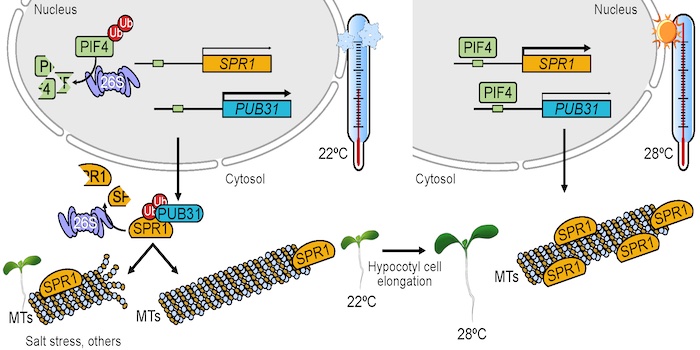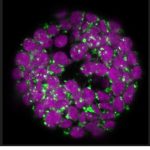Role of the PUB31–SPIRAL1 module in hypocotyl elongation
By Dingding Zhou, Xiaohong Wang, Xiangfeng Wang, and Tonglin Mao
China Agricultural University
Background: During growth responses to high ambient temperature (thermomorphogenesis), hypocotyl cell elongation increases, helping the plant to stay cool and avoid heat flux. The transcription factor PHYTOCHROME-INTERACTING FACTOR 4 (PIF4) is a key regulator of high ambient temperature–induced hypocotyl elongation. Multiple studies addressing plant thermomorphogenesis have focused on the regulation of PIF4 levels, transcriptional activity, and the downstream mechanisms of triggering phytohormone-induced elongation responses. Microtubules have essential functions in plant cell growth and are regulated by multiple microtubule-associated proteins (MAPs). However, the role and underlying mechanisms of the MAP-microtubule modules in high ambient temperature–induced hypocotyl elongation, particularly in relation to PIF4 function, remain poorly understood.
Questions: How does the MAP-microtubule module participate in high ambient temperature–induced hypocotyl elongation?
Findings: The Arabidopsis MAP SPIRAL1 (SPR1) plays a positive role in hypocotyl cell elongation during plant thermomorphogenesis. Accordingly, cortical microtubule reorganization from oblique and longitudinal to transverse was partially hindered in spr1-6 mutant cells at 28°C. High ambient temperature induces SPR1 expression in a PIF4-dependent manner and stabilizes SPR1 protein. The Plant U-box Type E3 ubiquitin ligase 31 (PUB31) interacts with and ubiquitinates SPR1, but the effect of ubiquitination on SPR1 decreased at 28°C. PIF4 directly binds to the PUB31 promoter and down-regulates its expression at high temperature. Our results demonstrated that PIF4 induced SPR1 expression and suppressed PUB31 expression, resulting in the accumulation and stabilization of SPR1 protein and further promoting hypocotyl cell elongation by altering cortical microtubule organization during Arabidopsis thermomorphogenesis.

Next steps: In future studies, we will investigate the detailed mechanism by which PIF4 regulates SPR1 expression at high temperature and the role of microtubules in plant cell responses to heat stress.
Reference:
Dingding Zhou, Xiaohong Wang, Xiangfeng Wang, and Tonglin Mao (2023) PHYTOCHROME INTERACTING FACTOR 4 regulates microtubule organization to mediate high temperature–induced hypocotyl elongation in Arabidopsis https://doi.org/10.1093/plcell/koad042



